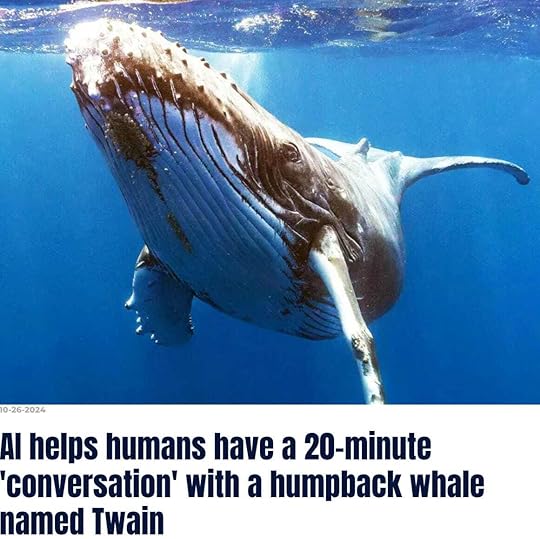Why can't I stop clicking articles about whales?
This is a newsletter primarily about exercising discernment in a media-saturated world. I urge readers to not let devices control their attention. But I need to come clean. Sometimes, when I open Chrome on my phone or other device, its algorithm feeds me articles about whales, and I can’t help myself, before I know it I’ve clicked.
Here’s a smattering of whale articles that I’ve clicked in the last six months:
Oct 29 -Where have all the sperm whales gone? Scientists think they know / Earth.com
Sep 28 - Drone footage reveals orcas hunting unexpected prey off Chile for first time | The Independent
September 6 -"Russian spy" beluga whale that was found dead "had multiple bullet wounds," animal rights group says / CBS News
August 3 - A humpback whale in Washington state is missing its tail. / AP News
July 15 - Creature that washed up on New Zealand beach may be world's rarest whale — a spade-toothed whale / CBS News
July 12 - The sperm whale 'phonetic alphabet' revealed by AI / BBC News May 10 - Visited Cruise ship drags dead whale into New York / WaPo
Why? I’m not a cetologist! I like animals but I wouldn’t put myself in the top 25% of animal lovers. I do like whales. They are magnificent with enormous brains and evoke mystical wonder. But still, why when I see an article about whales, must I click it? The interesting moment precedes the click. I don’t ask myself, ‘Why am I clicking this?”
It’s instant. I click. Then, I may think, “Why did I just do that?”
But cognition arrives late.
Krishnamurti, I believe, was right; thought is overrated. We think we have control over our emotional responses. Our prefrontal cortex would like that to be true. I’d go a step further, our collective belief in cognition, in our ability to reason our way through the world, is dangerous because it’s incongruent with reality.
If you aren’t familiar with my relationship with the ideas of J.Krishnamurti — read this.
I’m not saying that it’s wrong to give in to impulse on occasion and read a clickbait-y article from Earth.com entitled: AI helps humans have a 20-minute 'conversation' with a humpback whale named Twain. (SPOILER: Researchers sent a recorded humpback “contact” call into the ocean using an underground speaker. A humpback approached their boat and responded matching the intervals of the call). No meaningful dialogue was had.

But back to my point re: the limits of cognition vs. the Internet and News media.
The amygdala is part of the visceral brain stem. It is important for emotional regulation. Critically, it is part of the limbic system and therefore it is difficult to control it with cognition. You can use cognition to some extent but it requires a lot of training. It responds better to physiological control — controlled breathing, cold exposure.
Since I’ve been clicking whale articles, I’m fed more of them, naturally. It’s a burden to my impulse control to resist their song. I’m not going to splash my face with water every time Chrome throws up a whale link.
Impulse control is governed by the amygdala.
No matter how strong of a thinker you believe yourself to be, the amygdala is operating below the level of cognition. The algorithms and the news media are targeting the amygdala. It’s not an admission of weakness to say that we have limited control in our response to stimuli. It’s fact.
We have to try (and I do try!) to limit the stimuli because managing our response to them is very hard.
There’s a lot more to say on this subject. In fact, I intend to write a piece (with appropriate distance) on elections as battles between the amygdala and the pre-frontal cortex but I’ll stop there for now. I’m waging a long war on cognition. For too long, I’ve reified it. This is just one salvo in that long war.
Please Review and Rate MISSY:If you have read MISSY and enjoyed it, then please leave a review and rating on Goodreads and Amazon. You may think it inconsequential; nothing could be further from the truth. Every review helps me and my agent improve our pitch to US publishers.

The best online retailers for my book are currently Waterstones and Blackwells. If you’re in Chicago, you can get a copy from me directly at a discounted rate. Here’s the India pre-order link.
Thanks for reading The Last Stop on the Late Train! This post is public so feel free to share it.
Thanks for reading The Last Stop on the Late Train! Subscribe for free to receive new posts and support my work.



